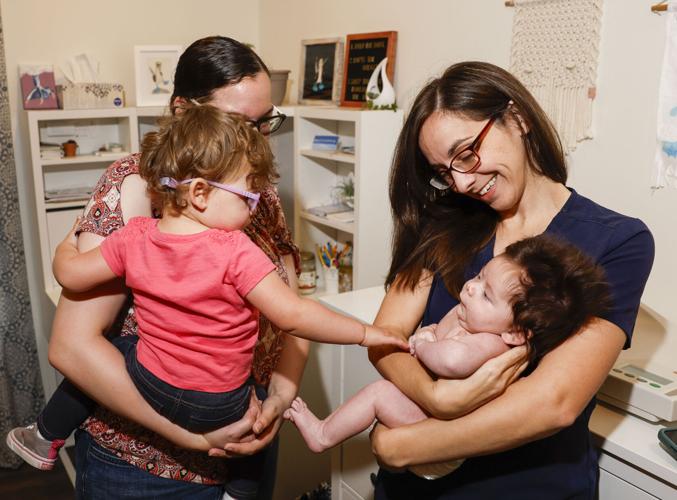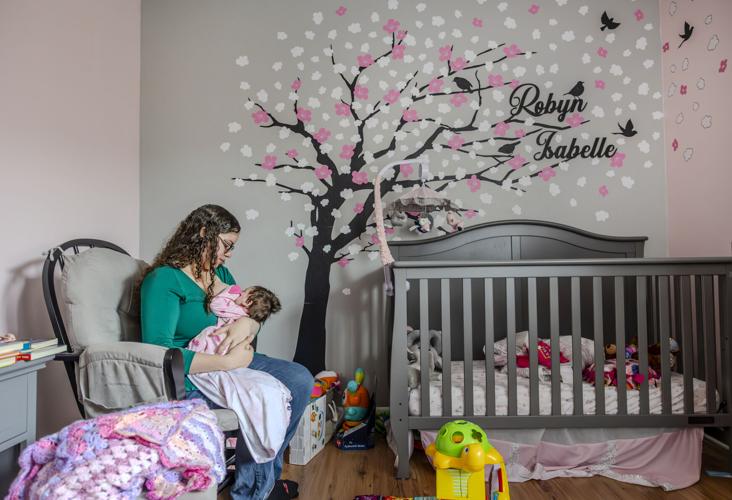In an unmarked building on Metairie Road, new parents lug cushioned car seats cradling newborns down the hall and into a one-room office.
There are parents sick with worry over weight loss or feeding issues who come from as far as Shreveport. There are babies with Down syndrome and cleft palate who need extra support. There are bereaved mothers whose milk is a painful reminder of their loss. There are injured nipples with open wounds, cracked and bleeding. Often, there are tears.
Waiting for them is Dr. Lisa Credo, one of Louisiana’s only breastfeeding medicine physicians.
“This is hard,” she tells them all.
“I say that about ten times per day,” said Credo, 40.
For all the emphasis put on pregnancy and birthing plans, for many moms, the hardest, most unknowable part comes after: figuring out how to feed a newborn. Breastfeeding is promoted as evidence-based care on labor and delivery floors, and research shows there are benefits for moms and babies. But lactation is one of the only bodily functions few medical providers have training in. There is no single right way to feed a baby, but sometimes, the decision to breastfeed is less about choice and more about whether there is support.

Nine-week-old Ayva Quatrocci gets weighed by Dr. Lisa Credo at Advanced Breastfeeding Medicine in New Orleans, Saturday, Nov. 18, 2023. (Photo by Sophia Germer, The Times-Picayune)
About seven out of ten new moms have tried breastfeeding their children in Louisiana, but only 38% are exclusively breastfeeding at three months, according to state data reported to the Centers for Disease Control and Prevention. The national average is 45%.
‘The Patron Saint of Boobs’
Hours before Christina Meisner walked into Credo’s office earlier this year, she was drenched in sweat, tears dripping down her face as she tried to nurse her newborn. Every time he latched, it felt like razor blades on her skin.
“If my arm accidentally grazed my breast when I wasn't nursing, I thought I was going to pass out,” said Meisner, 37.
Breastfeeding her second child was important to Meisner. She saw six lactation consultants with her first baby, born in Texas during the height of the pandemic. She developed mastitis, a painful infection of the breast tissue. She left every lactation session in tears, ultimately deciding to pump milk and formula feed for the first year of his life when nursing didn’t work out.
“It felt like I was a failure,” said Meisner. “Everybody said this is supposed to be easy. Nobody was talking about how hard it is.”
Credo took out a crocheted breast in her office, demonstrating a latching technique. She had Meisner stack two specialized breastfeeding cushions on top of each other to position the baby just so.
“She latched him onto my breast, and there was no pain,” said Meisner. “She’s like the patron saint of boobs.”
Few breastfeeding medicine physicians

Nine-week-old Ayva Quatrocci gets weighed by Dr. Lisa Credo at Advanced Breastfeeding Medicine in New Orleans, Saturday, Nov. 18, 2023. (Photo by Sophia Germer, The Times-Picayune)
Lactation consultants have historically played an important role in breastfeeding. They roam hospital delivery wards and help attach the baby to the breast. But lactation consultants do not diagnose, treat or call in prescriptions, and they are not part of routine pospartum care. Insurance doesn’t always cover lactation support or limits the number of sessions. Many moms have medical issues that need special care, and infants may have anatomy obstacles, such as tongue ties, preventing them from effectively removing milk.
“A team-based approach really works best,” said Credo.
Credo, a New Orleans native, is unique in her specialty. She is one of just four physicians in Louisiana who are members of the Academy of Breastfeeding Medicine.

Dr. Lisa Credo poses at Advanced Breastfeeding Medicine in New Orleans, Saturday, Nov. 18, 2023. (Photo by Sophia Germer, The Times-Picayune)
The American Academy of Pediatrics and the World Health Organization recommend exclusive breastfeeding for the first six months of a baby’s life, and continued breastfeeding for at least two years.
But the medical and economic situations Louisiana women face make that a near-impossible goal to reach.
Louisiana has no paid family, medical or sick leave. The majority of Louisiana’s new moms — 65% — reported not having access to paid parental leave.
“You're not going to breastfeed if you have no leave from your job,” said Dr. Rebekah Gee, an OB-GYN, former health secretary of Louisiana and founder and CEO of Nest Health. Louisiana hospitals have worked to introduce breastfeeding, but women are up against many roadblocks: they make less money, struggle to find affordable childcare and often don’t have reliable transportation, said Gee.
There is also a lack of training for medical providers who might be the first person a struggling mom sees.
“I’m an OB, I went to Harvard and I had no training at all in breastfeeding,” said Gee.
Louisiana’s women also experience a high number of complications during birth, especially among Black women, who are more than twice as likely to die from pregnancy-related causes as White mothers.
“If more women are having complications, that’s going to impact breastfeeding and bonding, that maternal-infant attachment," said Tyra Gross, associate professor of public health at Xavier University of Louisiana.
In 2014, the initiation rate for breastfeeding in Louisiana was 57%, the lowest in the nation, compared to today’s 71%. But still, only a handful of states have lower breastfeeding rates than Louisiana at any point before a child’s first birthday.
The state is leaving many benefits on the table for women who want to breastfeed but find it too difficult. Breastfeeding decreases a mother’s immediate risk of postpartum hemorrhage, anemia, depression, and urinary tract infections and her lifetime risk of diabetes, hypertension, cardiovascular disease, obesity, rheumatoid arthritis, lupus, endometriosis, and osteoporosis, as well as breast and ovarian cancer.
Breastfed babies have fewer digestive problems, fewer infections, better vision and a lower risk of sudden infant death syndrome. Later in life, breastfed babies are less likely to be diagnosed with cancer, asthma, allergies and diabetes.
'Your worth is not measured in ounces'
Tiffany Quatrocci is a nurse with NICU experience teaching moms to latch. But after a difficult birth complicated by severe preeclampsia, Quatrocci noticed her 5-pound, 5-ounce baby wasn’t latching. Lactation appointments at the hospital were booked a month out.

Tiffany Quatrocci breast feeds her newborn, Ayva, at home in Metairie on Friday, November 17, 2023. (Photo by Chris Granger, The Times-Picayune)
“If you have a baby that can’t eat, you can’t last a month,” said Quatrocci. Her obstetrician mentioned Dr. Credo.
Two days later, Credo identified a severe tongue tie that prevented the baby’s oral muscles from developing. Ultimately, nursing didn’t work for them, and Quatrocci decided to pump instead.
“She didn't make me feel bad about any sort of decision,” said Quatrocci. “I just felt a lot of support from her.”
For women inundated with “Breast is best” slogans and pressures to breastfeed even without policies that might make it easier, breastfeeding can be all things: difficult, natural, painful, impossible and beautiful. In Credo’s office, they find a sympathetic, informed practitioner who found feeding her own three children challenging, even with all of her expertise.
“There's something about the way she listens to you,” said Jessica Harkness Nehrbass, who took her third child to Credo. “You finally get some sense of comfort or affirmation of like, ‘Oh, yeah, this is like a real thing. It's a real struggle.’”
Personalized care
For all of the pain Credo sees, her office is a happy place. Moms arriving in tears leave with a plan.
The walls are covered in renderings of blue-footed boobies (a marine bird that nests on islands in the tropical eastern Pacific), a wink to her specialty. On a bookshelf, a breastfeeding mantra is displayed: “Your worth is not measured in ounces.”
“There is no quitting in breastfeeding, there is just changing your plan,” said Credo. Despite the benefits, there is nothing better for a baby than a mom in good mental health, she reminds patients.
On a recent Saturday, Credo saw her usual “parade of babies.” On holidays like Thanksgiving, she monitors her cell phone for emergencies. It's a level of care most patients aren’t used to.
“I couldn't believe it,” said Nehrbass. “Before I even had my first appointment, she was texting with me in the middle of the night about the baby's latch and the number of minutes she was eating.”
First appointments are two hours. Sometimes, it’s only in the very last minute that something finally clicks.
“It's honestly, to me, almost a lot to get through in two hours,” said Credo.
A pediatrician by training, Credo worked for a state-run program called The Gift that aimed to increase breastfeeding rates before opening her own practice in 2020. Although she has never advertised, she sees 1,600 patients yearly. She tries, but can’t see everyone who contacts her.
But there is hope that the field is expanding. Credo recently helped develop the first board exam for breastfeeding doctors. Just like physicians can be licensed in specialties like dermatology, the exam carves out a much-needed blueprint that defines the knowledge for breastfeeding medicine. The first group sat for the pilot exam in October.
Credo’s six-year-old recently donned navy blue scrubs and carried a doll wrapped in a hospital blanket to her kindergarten class. On her career day worksheet, she drew a girl with long brown hair holding a smiling baby. In the blank space asking what she wanted to be, she wrote “Bresfedige Dodr.”








